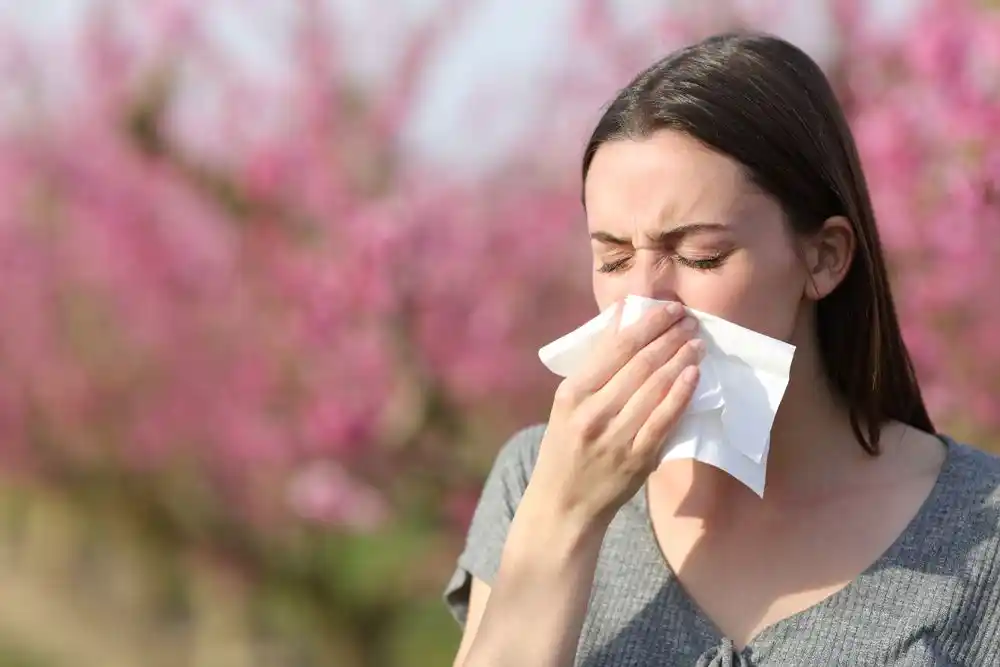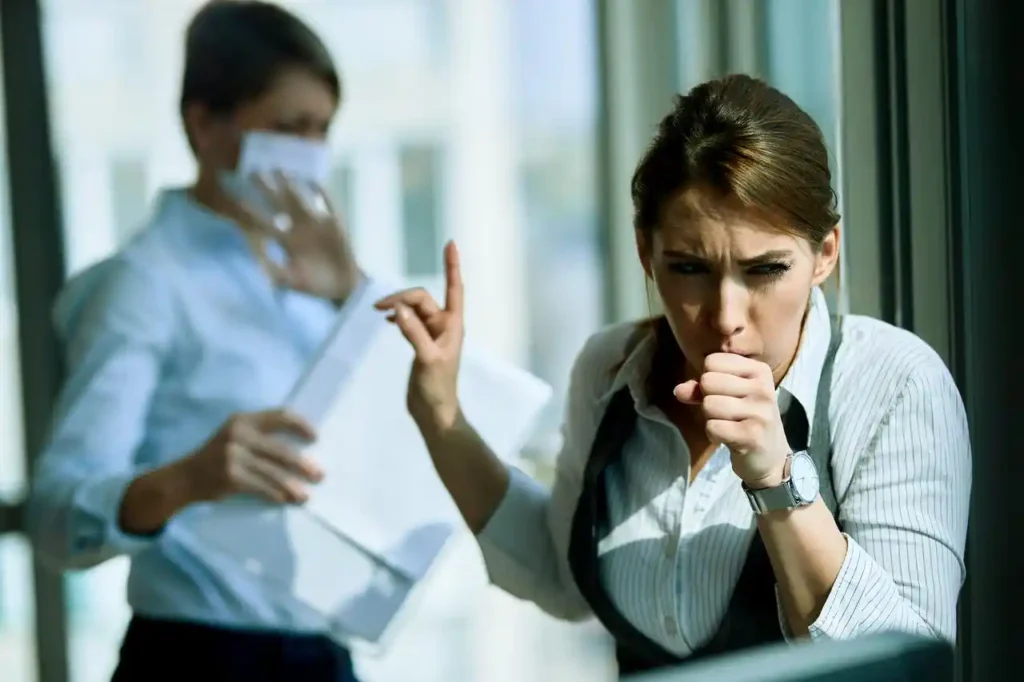When you’re more exhausted and have less energy during allergy season, you might wonder: Do allergies make you tired? The answer is yes. Many people experience allergy fatigue. This happens when allergy symptoms such as a stuffy nose, sneezing, itchy eyes, or constant congestion disrupt your sleep and drain your energy. Over time, this ongoing struggle exhausts you.
We will break down what causes allergies to make you feel tired and what you can do to reduce allergy symptoms.
What Is Allergy Fatigue?
Allergy fatigue refers to the exhaustion and fatigue that are usually experienced with allergy symptoms. The question many people ask is, do allergies make you exhausted, as the tiredness can be as disruptive as sneezing, itchy eyes, or a clogged nose. In contrast to tiredness, which is an outcome of a busy day, allergy fatigue occurs when your immune system continues its reaction to allergens, which puts pressure on your body and exhausts it.
The persistent symptoms may be hard to handle personally, which is why professional care offers specific tests and treatment. This approach not only minimizes allergy fatigue but also helps with the associated issues, like allergy-related coughing.
The Science Behind Allergy Fatigue
When the question arises, why do allergies make you tired, the answer is based on how your immune system responds to allergens. When triggers such as pollen, dust, and other substances get into the body, your immune system responds as though they are threats and emits chemicals like histamines. The results of these chemicals include sneezing, watery eyes, and congestion, and such chemicals can also make you feel tired.
On top of that, your body is working harder than usual to fight these “invaders,” which explains why many experience ongoing exhaustion. For some, the tiredness can last longer and even worsen other symptoms like fever caused by allergies

Common Allergens That Cause Fatigue
Not all allergens affect people in the same way, but several common triggers are closely linked with tiredness. Do seasonal allergies make you tired? Yes, pollen from trees, grasses, and weeds is one of the biggest causes of allergy fatigue. Dust mites, mold spores, and pet dander can also create ongoing immune responses that leave the body drained of energy.
In some cases, sinus-related issues add to the problem, which is why many wonder, why do sinus allergies make you tired. Congestion and pressure in the sinuses make breathing harder and reduce sleep quality, adding another layer of exhaustion. Ongoing sinus discomfort may also lead to allergy-related sore throat, which makes fatigue feel even worse.
Symptoms of Allergy Fatigue
Allergy fatigue is more than just feeling a little tired. It impacts your body and mind in various ways, and these symptoms tend to accumulate and make the person feel even worse. The following are the most common symptoms:
Brain Fog
Brain fog is one of the most irritating symptoms. It is the time when your mind is cloudy and slow. You may forget common stuff, may not be able to concentrate at work or school, or find it hard to concentrate on daily tasks. Brain fog occurs because your immune system is busy fighting off allergens, thus having less energy to make your brain work effectively.
Sleep Apnea
Your nose and throat may get blocked by mucus, and you will not breathe easily at night due to allergies. This occasionally causes sleep apnea, where your breathing stops and starts repeatedly during your sleep. Sleep deprivation leaves you feeling tired the following day, and many people wonder how long does allergy fatigue last because you will continue to experience this feeling as long as allergies are active.
Breathing Issues
Congestion, wheezing, and shortness of breath are common allergy problems. These breathing issues force your body to work harder just to get enough oxygen. Struggling to breathe comfortably during the day or at night drains energy quickly and adds to overall fatigue.
Weak Immune System Response
When you’re exposed to allergens, your immune system treats them like dangerous invaders. This ongoing fight weakens your body’s natural defenses. Over time, your immune system becomes overloaded, which is why many people ask, can allergies make you tired and achy. The constant reaction not only makes you feel sore but also leaves you run-down.
Other Common Symptoms
Aside from tiredness, allergies often bring along watery eyes, sneezing, headaches, or even a mild fever. In fact, persistent eye irritation can sometimes be confused with pink eye or allergies. These problems may seem small on their own, but together they can seriously affect your comfort and energy levels.

Combatting Allergy Fatigue
The good news is that allergy fatigue doesn’t have to take over your life. With a few smart steps, you can ease symptoms, bring back your energy, and start feeling like yourself again. Here’s how to fight back:
Get Allergy Testing
If you’re not sure what’s triggering your symptoms, allergy testing can be really helpful. It shows whether pollen, dust, mold, or pet dander is the main problem. Once you know the cause, it becomes much easier to avoid or manage it.
Focus on Better Sleep
Tiredness often gets worse when you’re not sleeping well. Creating a clean and allergen-free bedroom can make a big difference. Wash your bedding often, use air filters, and keep the windows closed during pollen season. These small steps help you breathe easier and rest better at night.
Try Medications When Needed
Over-the-counter options like antihistamines or decongestants can ease allergy symptoms for many people. If your symptoms are stronger or last longer, a doctor may suggest prescription treatments or allergy shots. Even though some wonder if shots can make you more tired, most people actually find that they help reduce fatigue by calming the immune system over time.
Use Eye Drops
Watery, itchy eyes are not only annoying but also draining. Allergy eye drops can bring quick relief, making it easier to get through the day without constant irritation.
When allergies start interfering with your daily routine, professional care can provide more than just quick fixes.
In some cases, treatment also addresses related issues, such as whether allergies can cause strep throat or cold sores, which often contribute to overall fatigue.
Tips for Managing Allergy-Related Fatigue
Living with allergy fatigue can be frustrating, but small lifestyle changes often make a big difference. These practical tips can help you feel more energized and in control:
- Drinking enough water helps thin mucus and reduces congestion, making it easier to breathe and feel less sluggish.
- Pollen counts are usually higher in the morning and on windy days. Planning activities later in the day can reduce flare-ups.
- Fresh fruits, vegetables, and foods rich in antioxidants can strengthen your body’s response to allergens.
- If fatigue sets in during the day, even a 10-minute rest, stretch, or walk outside can recharge your energy.
- Consistency with medications, nasal sprays, or allergy care plans helps prevent fatigue from building up over time.

Conclusion
So, do allergies make you tired? Yes, allergy fatigue is real and can leave you feeling drained both physically and mentally. From brain fog and breathing troubles to poor sleep, allergies affect more than just sneezing or itchy eyes. The good news is that with proper care, medications, and simple lifestyle changes, you can reduce fatigue and restore your energy.
If allergies are affecting your daily life, NovaMed is here to help. Their team provides testing, treatment, and personalized guidance to manage symptoms effectively and bring lasting relief. Schedule an appointment today to start feeling your best.






